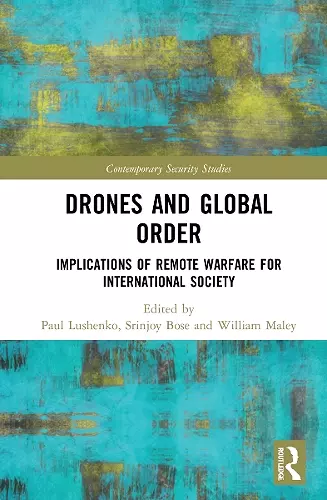Drones and Global Order
Implications of Remote Warfare for International Society
William Maley author Srinjoy Bose author William Maley editor Srinjoy Bose editor Paul Lushenko editor
Format:Hardback
Publisher:Taylor & Francis Ltd
Published:29th Dec '21
Currently unavailable, and unfortunately no date known when it will be back
This hardback is available in another edition too:
- Paperback£41.99(9780367689261)

This book explores the implications of drone warfare for the legitimacy of global order.
The literature on drone warfare has evolved from studying the proliferation of drones, to measuring their effectiveness, to exploring their legal, moral, and ethical impacts. These "three waves" of scholarship do not, however, address the implications of drone warfare for global order. This book fills the gap by contributing to a "fourth wave" of literature concerned with the trade-offs imposed by drone warfare for global order. The book draws on the "English School" of International Relations Theory, which is premised on the existence of a society of states bounded by common norms, values, and institutions, to argue that drone warfare imposes contradictions on the structural and normative pillars of global order. These consist of the structure of international society and diffusion of military capabilities, as well as the sovereign equality of states and laws of armed conflict. The book presents a typology of contradictions imposed by drone warfare within and across these axes that threaten the legitimacy of global order. This framework also suggests a confounding consequence of drone warfare that scholars have not hitherto explored rigorously: drone warfare can sometimes strengthen global order. The volume concludes by proposing a research agenda to reconcile the complex and often counter-intuitive impacts of drone warfare for global order.
This book will be of considerable interest to students of security studies, global governance, and International Relations.
‘Autonomous and remote weapons are the future of warfare, yet until now there has been surprisingly little reflection on their implications for world order. Utilizing international theory and keen insight into contemporary world politics, this impressive volume sheds new light on the system-wide effects of drones on the laws, norms, and practice of warfare, and sets an agenda that others will be obliged to follow.’-
Alex J. Bellamy, The University of Queensland, Australia
'This superb collection of essays significantly advances our understanding of the consequences of drone warfare for global order.'
Stefan Borg,Swedish Defense University, Stockholm
'This book is timely, insightful, and provocative—exactly what is needed to advance the drone warfare debate. The co-editors 'bridge the gap' between academia and the military by including chapters from the world’s leading experts and practitioners of remote warfare. The authors’ insights will help inform decisions of combat leaders across all—tactical, operational, and strategic—levels of war. Students at the War Colleges must read this book to adequately prepare for an era of robotics-enabled warfare.'
Barry McCaffrey,General Retired, U.S. Army, USA
'This important book adds significantly to our understanding of drone warfare in the contemporary era by marrying the contributors’ substantial empirical knowledge with insights drawn from the so-called 'English School' approach to International Relations Theory. This results in a better appreciation of how drone warfare shapes, and is shaped by, the global social order, which English School scholars label international society. Some may consider this hyperbole. However, I also see signs of a change in the evolving phenomenon of drone warfare of perhaps similar magnitude to that of the nuclear revolution at the end of WWII, especially when paired with the related developments in artificial intelligence and cyber warfare. The cumulative effect of these developments may be profound and unsettling for international society, and this book offers a useful platform for thinking through these issues in a more systematic way.'
Laust Schouenborg, University College London, UK
'The editors and contributing authors represent an impressive mix of respected, well-established academics; young scholars entering academia; and practitioner-scholars with deep empirical experience. Each of the thirteen chapters is the product of well-documented, rigorous scholarship.'
Professor Richard Norton, U.S. Naval War College, USA
ISBN: 9780367689223
Dimensions: unknown
Weight: 544g
270 pages